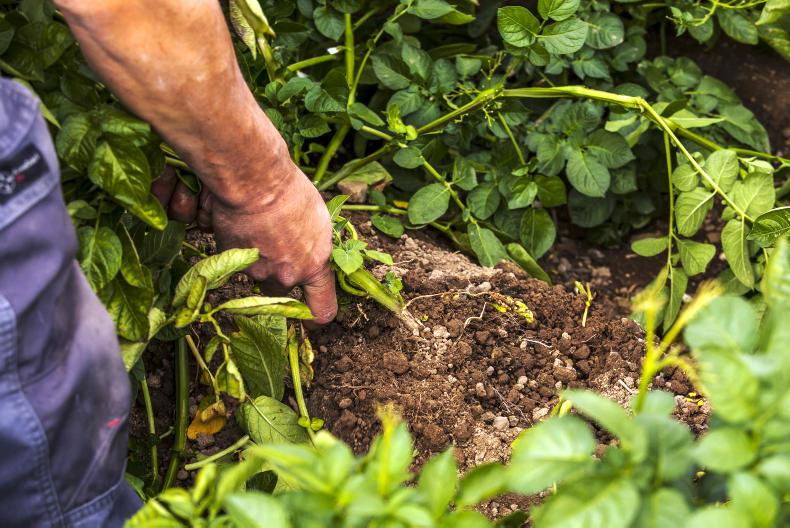It is well-documented that there is a significant labour shortage in certain parts of the agri-food industry. It is estimated that almost 2,000 operative level jobs in meat factories will be required over the next number of years while on-farm roles, such as on dairy farms, are plentiful.
Similarly, horticulture is an industry that is crying out for labour. It is estimated there is a shortage of between 1,800 and 2,000 workers in the horticulture industry each year in Ireland. The Teagasc report on Labour in Horticulture published in 2019 stated that there was a 14% vacancy rate across the sector, while an incredible 87% of all workers were employed at operative level.
The pressure on companies derived from such a shortage is telling. The same report outlined that the inability to recruit adequately is inhibiting almost 70% of company’s ability to expand while almost 60% reported difficulties maintaining their current output. The figures are concerning.
However, this shortage is not just at operative level. Industry experts are noting a shortages for skilled labour also. With both a skills and labour shortage facing the sector, stakeholders are trying to find solutions, and fast. One such stakeholder is Teagasc and the educational body have targeted Bloom in the Park as a means to attract more graduates into their horticulture courses in National Botanic Gardens and in Kildalton Agricultural College.
There is a frustration out there among companies. We see it each year when companies come to our open days
Deirdre Walsh, a college teacher in the National Botanic Gardens, will represent Teagasc at Bloom over the weekend along with her colleagues. For Deirdre, companies are finding it more and more difficult to manage the low supply of skilled horticulturists.
“There is a frustration out there among companies. We see it each year when companies come to our open days. These open days allow colleagues from the across the industry to come into the college to meet with graduates and try to attract these graduates into their company. There is a big demand for graduates but the supply is not there. They need qualified horticulturists as well as general operatives.”
With companies waking up to the fact that the supply of skilled workers is tight, they are using facilities in educational centres like Teagasc to upskill those at operative level.
“Teagasc provides Continuous Professional Development (CPD) courses for companies across a lot of disciplines that would have a lot of unskilled labour. Companies can come to us for basic training and we tailor the training to suit the companies. This is a method companies are using to try and curb this issue.”
The initiative means that progression is now an option for those at operative level and may make the industry more attractive for those looking to work in horticulture.
We certainly find a difficulty in attracting qualified and experienced horticulturists
There are also other innovative methods by which companies in the sector are curbing the labour issue and skills shortage. Paraic Horkan is the founder of Horkans Garden Centre. Similar to other companies, they face the challenge of staff shortages but have adapted in certain ways.
“We certainly find a difficulty in attracting qualified and experienced horticulturists so we would have a focus on internal training to upskill our employees,” he explains.
“We have also developed our digital platforms and put a huge emphasis on these. These are simply interactive video screens in our garden centre that customers can use which gives them an idea how to use our products. Instead of asking our staff, they can use the digital platforms. What it does is acts as a customer support and frees up labour.”
Horkan is one of the industry’s leading experts and vocal on the topic of labour in the sector. According to the horticulturist, he believes the opportunities are plentiful for those looking to pursue a career in the industry.
“Horticulture is such a broad industry, from green keeping, to nurseries, to landscape gardening, to garden design, to vegetables, there is such a breath of opportunity and the skills are transferable. You can travel all over the world. The common language of horticulture is Latin, whether you are in Ireland, Germany or Japan, the name of plants and the skills are the same.”
Horkan will also be speaking at the expert stand on the main stage at Bloom. While skilled staff is a vital part of the business, maintaining operative level staff is arguably more crucial.
It is difficult to find people but keeping people is arguably the most difficult
According to the Teagasc report, 87% of workers in the industry with employed at operative level. Retaining staff is therefore essential.
“It is difficult to find people but keeping people is arguably the most difficult,” Deirdre Walsh comments. “It really comes down to what people are paid and what conditions they are working under. Companies need a staff retention plan to keep staff happy.”
This sentiment is echoed by those in the sector, with growers in particular citing pay as the most important factor in attracting and retaining staff, the Teagasc report states.
As the demand for both skilled and unskilled workers in the sector rises, so too does the importance of promoting horticulture courses across Ireland. For those interested in a career path in the industry, Bloom may provide them with information on courses to look into and career advice on the potential in the sector. From speaking with those in the industry, there are opportunities aplenty.
Teagasc will be at Stand 15 in the Floral Marquee.
Applied horticulture is currently proposed and in development. It will be a two-year apprenticeship run by Teagasc in Kildalton.
The current Teagasc courses take place in Kildalton and National Botanic Gardens. They are:
Teagasc Level 5 cert in horticulture. Teagasc Level 6 cert horticulture.
Programmes
Advanced certificate in horticulture (food production).Advanced certificate in horticulture (landscape). Advanced certificate in horticulture (nursery).Advanced certificate in horticulture (sports turf).Duration for each is two years.
Level 8
UCD: landscape architecture BSc (architecture). UCD: horticulture, landscape and sportsturf management. TUD (formerly IT Blanchardstown):
horticulture.Level 7
Kildalton (WIT):
horticulture.National Botanical Gardens (WIT): horticulture. TUD (formerly IT Blanchardstown):
horticulture
It is well-documented that there is a significant labour shortage in certain parts of the agri-food industry. It is estimated that almost 2,000 operative level jobs in meat factories will be required over the next number of years while on-farm roles, such as on dairy farms, are plentiful.
Similarly, horticulture is an industry that is crying out for labour. It is estimated there is a shortage of between 1,800 and 2,000 workers in the horticulture industry each year in Ireland. The Teagasc report on Labour in Horticulture published in 2019 stated that there was a 14% vacancy rate across the sector, while an incredible 87% of all workers were employed at operative level.
The pressure on companies derived from such a shortage is telling. The same report outlined that the inability to recruit adequately is inhibiting almost 70% of company’s ability to expand while almost 60% reported difficulties maintaining their current output. The figures are concerning.
However, this shortage is not just at operative level. Industry experts are noting a shortages for skilled labour also. With both a skills and labour shortage facing the sector, stakeholders are trying to find solutions, and fast. One such stakeholder is Teagasc and the educational body have targeted Bloom in the Park as a means to attract more graduates into their horticulture courses in National Botanic Gardens and in Kildalton Agricultural College.
There is a frustration out there among companies. We see it each year when companies come to our open days
Deirdre Walsh, a college teacher in the National Botanic Gardens, will represent Teagasc at Bloom over the weekend along with her colleagues. For Deirdre, companies are finding it more and more difficult to manage the low supply of skilled horticulturists.
“There is a frustration out there among companies. We see it each year when companies come to our open days. These open days allow colleagues from the across the industry to come into the college to meet with graduates and try to attract these graduates into their company. There is a big demand for graduates but the supply is not there. They need qualified horticulturists as well as general operatives.”
With companies waking up to the fact that the supply of skilled workers is tight, they are using facilities in educational centres like Teagasc to upskill those at operative level.
“Teagasc provides Continuous Professional Development (CPD) courses for companies across a lot of disciplines that would have a lot of unskilled labour. Companies can come to us for basic training and we tailor the training to suit the companies. This is a method companies are using to try and curb this issue.”
The initiative means that progression is now an option for those at operative level and may make the industry more attractive for those looking to work in horticulture.
We certainly find a difficulty in attracting qualified and experienced horticulturists
There are also other innovative methods by which companies in the sector are curbing the labour issue and skills shortage. Paraic Horkan is the founder of Horkans Garden Centre. Similar to other companies, they face the challenge of staff shortages but have adapted in certain ways.
“We certainly find a difficulty in attracting qualified and experienced horticulturists so we would have a focus on internal training to upskill our employees,” he explains.
“We have also developed our digital platforms and put a huge emphasis on these. These are simply interactive video screens in our garden centre that customers can use which gives them an idea how to use our products. Instead of asking our staff, they can use the digital platforms. What it does is acts as a customer support and frees up labour.”
Horkan is one of the industry’s leading experts and vocal on the topic of labour in the sector. According to the horticulturist, he believes the opportunities are plentiful for those looking to pursue a career in the industry.
“Horticulture is such a broad industry, from green keeping, to nurseries, to landscape gardening, to garden design, to vegetables, there is such a breath of opportunity and the skills are transferable. You can travel all over the world. The common language of horticulture is Latin, whether you are in Ireland, Germany or Japan, the name of plants and the skills are the same.”
Horkan will also be speaking at the expert stand on the main stage at Bloom. While skilled staff is a vital part of the business, maintaining operative level staff is arguably more crucial.
It is difficult to find people but keeping people is arguably the most difficult
According to the Teagasc report, 87% of workers in the industry with employed at operative level. Retaining staff is therefore essential.
“It is difficult to find people but keeping people is arguably the most difficult,” Deirdre Walsh comments. “It really comes down to what people are paid and what conditions they are working under. Companies need a staff retention plan to keep staff happy.”
This sentiment is echoed by those in the sector, with growers in particular citing pay as the most important factor in attracting and retaining staff, the Teagasc report states.
As the demand for both skilled and unskilled workers in the sector rises, so too does the importance of promoting horticulture courses across Ireland. For those interested in a career path in the industry, Bloom may provide them with information on courses to look into and career advice on the potential in the sector. From speaking with those in the industry, there are opportunities aplenty.
Teagasc will be at Stand 15 in the Floral Marquee.
Applied horticulture is currently proposed and in development. It will be a two-year apprenticeship run by Teagasc in Kildalton.
The current Teagasc courses take place in Kildalton and National Botanic Gardens. They are:
Teagasc Level 5 cert in horticulture. Teagasc Level 6 cert horticulture.
Programmes
Advanced certificate in horticulture (food production).Advanced certificate in horticulture (landscape). Advanced certificate in horticulture (nursery).Advanced certificate in horticulture (sports turf).Duration for each is two years.
Level 8
UCD: landscape architecture BSc (architecture). UCD: horticulture, landscape and sportsturf management. TUD (formerly IT Blanchardstown):
horticulture.Level 7
Kildalton (WIT):
horticulture.National Botanical Gardens (WIT): horticulture. TUD (formerly IT Blanchardstown):
horticulture 








SHARING OPTIONS